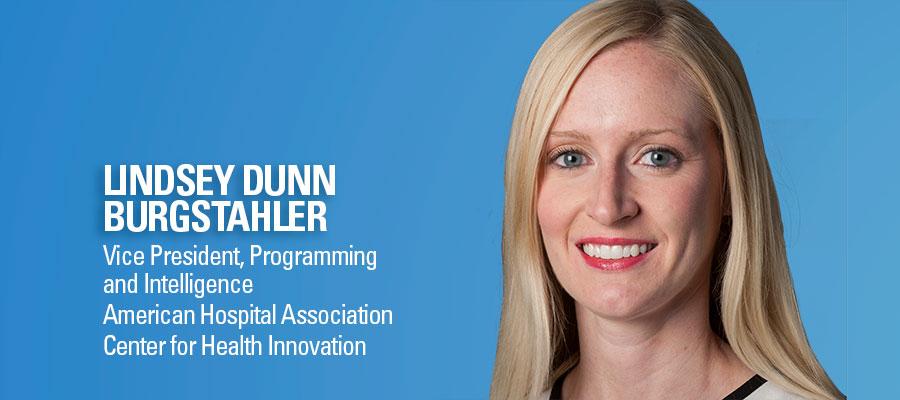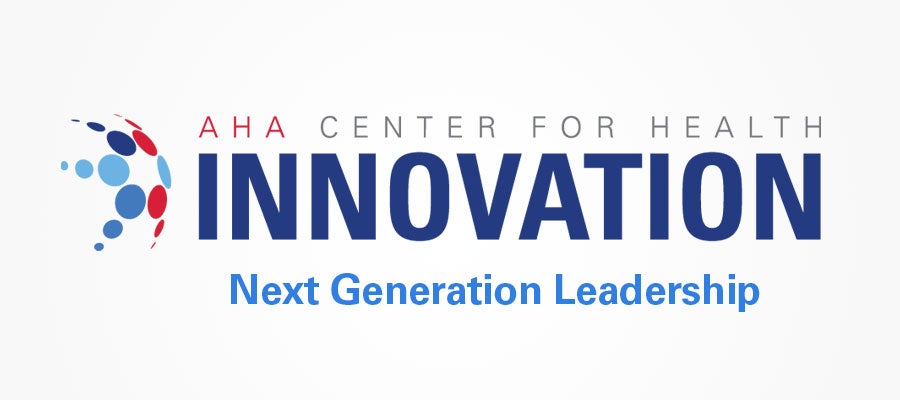Health Care’s Next Generation of Leaders Tackle Challenges, Innovate Solutions


Developing innovative approaches and creative solutions to tackle the unprecedented challenges in health care calls for skilled, knowledgeable and innovative leaders. Empowering the next generation of health care leaders is the aim of the AHA’s Next Generation Leaders Fellowship.
During the past year, 41 fellows participated in this fellowship, planning and executing a yearlong capstone project with the guidance of an executive-level mentor and their cohort network. Their work focused on key issues in health care including quality, safety, affordability and equity. Fellows also honed essential skills, such as expanding innovation capacity, driving organizational change and digital transformation, and leading the shift from health care to well care. Our AHA team is now accepting applications for the 2023–2024 cohort, due March 31.
Several fellows from the 2021–2022 cohort described their capstone projects, key takeaways from the fellowship experience and skills they gained. These projects addressed delirium in the intensive care unit, nursing workforce challenges, and the unique care needs of older adult patients and diabetic patients with heart disease.
Addressing Delirium in the ICU
For his fellowship project, Biren Kamdar, M.D., an ICU physician, pulmonologist and associate professor of medicine at UC San Diego Health, developed an ICU delirium playbook. Delirium affects up to 85% of patients in the ICU and is quite costly; yet nearly half of ICU nurses report receiving no prior delirium education. The playbook is a virtual, expandable platform for ICU nurse education and training, with a focus on delirium management in older adult patients who are critically ill and receiving mechanical ventilation and sedative infusions. Kamdar was one of The John A. Hartford Foundation Age-Friendly Fellow Scholarship recipients.
Kamdar found the fellowship “enlightening” as he was exposed to so many innovative ideas from diverse health care settings and met people in the field who are facing the same challenges. The most important skills he gained are likely “ones I have not yet realized,” said Kamdar. “The connections I’ve made from being part of this fellowship, the projects I’ve learned about, and the feedback I’ve received will transform the projects I’m currently performing and will help me gain skills and refine them moving forward,” Kamdar observed.
Focusing on the Nursing Workforce
Alicia LaPalombara, director of nursing operations at Allegheny Health Network, based in Pittsburgh, focused on the nursing workforce for her fellowship project. As a result of the COVID-19 pandemic, staffing had become one of the most pressing issues at AHN: The bedside vacancy rate had increased to about 30%, from 8% to 9% before the pandemic.
LaPalombara convened a team of nurse leaders that constructed a proposal called Work Your Way, which offers alternative work schedules and higher compensation. Nearly 800 nursing care team members elected to move into one of the new options; they gave the program positive feedback, as did those who didn’t opt in but benefited tangentially. Managers reported greater retention.
The opportunity the fellowship offered to “bounce ideas off my mentor and other fellows was hugely valuable in working through my project,” LaPalombara noted. “Gaining perspective from health care leaders outside of my organization helped to broaden my thinking and enrich my work, both on my fellowship project and in general.” She added, “I particularly enjoyed the [module] focused on effecting positive change, building emotional intelligence and supporting workforce resilience.”
Making Health Care ‘Age Friendly’
Tripp Grooms, director of business operations at Atrium Health Cabarrus, in Concord, N.C., led a project to improve care for older adult patients. This work used the Age-Friendly Health Systems 4Ms framework: what matters (to older adult patients and their families), medications, mentation and mobility. Grooms was one of The John A. Harford Foundation Age-Friendly Fellow Scholarship recipients.
Atrium Health Cabarrus established an Acute Care for Elderly, or ACE, task force with representation from medical leadership, nursing leadership, pharmacy, case management, senior behavioral care and administration. The task force developed care pilots that uniquely addressed each of the 4Ms, using volunteer patient ambassadors (what matters), a geriatric inpatient pharmacist (medications), transitions of care program (mentation) and exercise physiologist program (mobility). Outcomes include improved mobility compliance, decreased rates for inpatient falls, and reduced length of stay and readmissions.
Grooms said the AHA fellowship team provided excellent tools, resources and information on what the health care field is going through now and in the future. “[The fellowship] will set me up well to make an impact at my organization and in the communities we serve,” Grooms noted. He appreciated the opportunity to “enhance my leadership capabilities” and benefited from using the Prism assessment to “learn more about my leadership styles.”
Improving Care Management for Diabetic Patients with Heart Disease
Christina Johnson, M.D., health equity lead physician at Atlantic Medical Group, part of Atlantic Health System in New Jersey, addressed care management challenges for patients with type 2 diabetes, whose risk for cardiovascular disease is twice that of the nondiabetic population. A pilot program made up of diabetic patients with heart disease at Atlantic Health System revealed that 75% of diabetic patients are Black, and 45% of those patients demonstrated suboptimal diabetic control.
As part of Johnson’s capstone project, one of the health system’s outpatient practices formed a cross-functional team that included a primary care physician, nurse, diabetic educator, pharmacist and specialists (such as a nephrologist). This team identified patients who needed laboratory studies and routine diabetic management encounters. Patients received diabetic education and evaluations by health care specialists as needed. As a result of these interventions, within one quarter, nearly 50% of participating patients experienced a drop in their A1C level, and 50% of patients with A1C greater than 9% experienced a decrease in levels as well. This project is part of an organizational initiative that embeds health equity into quality and care delivery models.
Learning about the “power of creative collaboration” was a key part of the fellowship for Johnson. “By sharing the work with like-minded partners and communicating the work to team members and across the organization, we have been able to make tangible, population-level interventions to improve the lives of our patients and the community which we serve,” Johnson explained.
Becoming a Next Generation Leadership Fellow or Mentor
More details on these and other capstone projects are highlighted on the AHA Next Generation Leaders Fellowship webpages, which also provide fellowship program details, the current roster of mentors, and answers to frequently asked questions. I encourage you to become more familiar with this AHA program and its significant impact in the field.
The fellowship offers an outstanding opportunity to participate in a first-rate mentorship program — or nominate an emerging leader at your health care organization to get involved. The AHA also is looking for executive mentors. If you’re interested in volunteering, please complete this form.
Join us in this important work to bring about real and lasting change in our hospitals and health systems.
Lindsey Dunn Burgstahler is vice president, programming and market intelligence, at the American Hospital Association.

